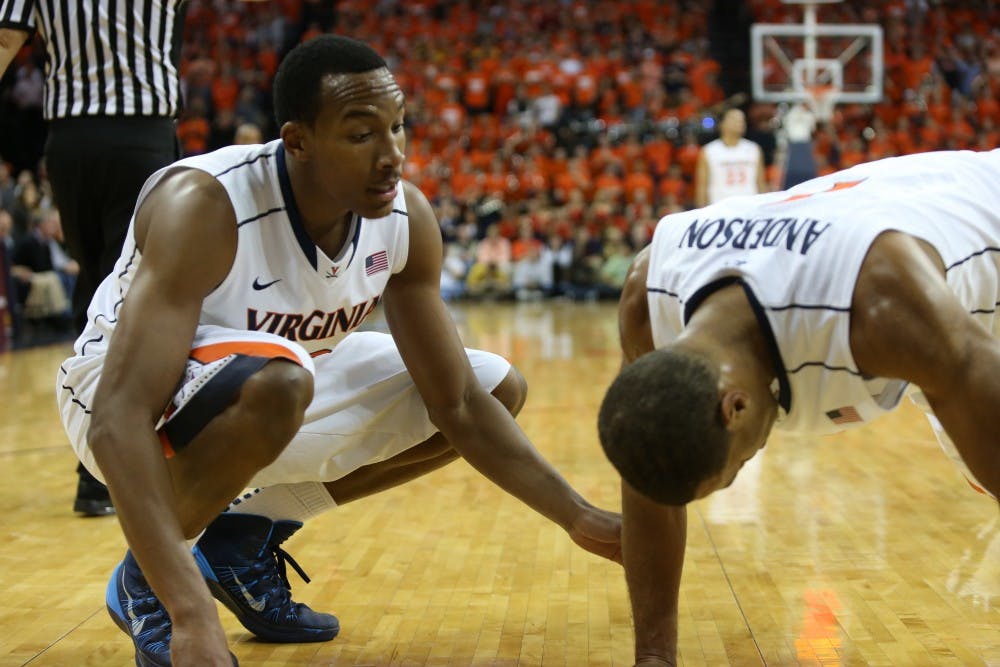When I reflect on the greatest games I’ve attended during my time at the University, a select few immediately stand out.
Obviously I include the 2012 football team’s 41-40 upset win against Miami, culminating in the Rocco-to-McGee connection in the back of the endzone. And I’m not sure anything could ever top men’s basketball’s 73-68 upset of then-No.3 Duke last year in front of one of the most raucous crowds John Paul Jones Arena has ever seen.
The No. 25 Cavaliers’ Tuesday night matchup against No. 14 Virginia Commonwealth had the potential to rank among those instant classics. Instead, I will remember that game by a late Virginia collapse down the stretch and Treveon Graham’s dagger of a 3-pointer to seal the Cavaliers’ fate.
But hey, at least I saw a great game, right? Wrong, sir, wrong!
I will also remember Tuesday as the night a little piece of the college basketball game I love died.
It was supposed to be a clash of in-state powerhouses — Tony Bennett’s methodical offense and pack line defense against Shaka Smart’s up-tempo offense and universally feared Havoc defense — with the result decided by the team that dictated the pace.
Instead, the referees took center stage in a nationally televised contest that featured more whistles than the background of a T.I. — or whoever the kids listen to these days — song, and slowed the game down to a pace Tony could only dream of achieving. All told, 48 fouls were called — or 1.2 per minute — 21 on Virginia and 27 on VCU.
“There were some calls I disagree with, there were some I agree with, and I think they are doing the best job they can in that situation,” Bennett said. “There are a lot of stoppages with the new emphasis on the rules. We’ll just have to keep trying to adjust.”
Bennett is referring primarily to the new emphasis on hand-checking. In an interview about these rules, NCAA director of officials, second President of the United States and subject of a critically acclaimed HBO biopic miniseries John Adams told ESPN.com “touching a dribbler is not a foul.”
Rather, the rules state that “keeping a hand on them is a foul, putting two hands on them is a foul, constantly jabbing at them is a foul,” according to Adams.
So it was — to put it lightly — incredibly frustrating Tuesday night when it seemed that the referees would stop the game for touch fouls outside of the three-point line that most people would be embarrassed to call in a pickup game, while bodies continued to bang inside the paint, business as usual. Many of the “fouls” weren’t constant jabbing or keeping a hand on an opponent, but seemed to stem from momentary incidental contact that didn’t warrant a bat of the officials’ eyes.
As a former elementary and middle school referee, I know how hard the job is, even at the most amateur levels. I sympathize with referees and generally don’t protest calls unless I believe one to be particularly egregious. But if this is the way games are going to be called all year, then the NCAA and the referees have fundamentally changed how defense and the game as a whole are played.
For teams like Virginia, who don’t land the game-changing Andrew Wiggins or Jabari Parkers of the world, playing physical team defense is vital to compete with elite teams. By effectively limiting the ability to play defense, the officials have tilted the playing field in favor of more offensively inclined teams.
“We’ve just got to play hands off, but still find a way to be physical,” redshirt sophomore guard Malcolm Brogdon said. “We’re a physical team and even though the rules might hurt us a little bit, we have to keep playing physical and not back down.”
Now this isn’t to say that Virginia lost to VCU because of the overabundance of fouls. The Rams play an even more aggressive style of defense and almost paid dearly for it, sending Virginia to the line 33 times. The Cavaliers failed to capitalize, though, making just 19 of those attempts — their 57.6 free throw percentage was the program’s lowest since going 9-18 Jan. 6, 2013 against North Carolina.
“We played hard, so did VCU,” Brogdon said. “It came down to the end of the game, but we didn’t take care of the ball or knock down free throws like we wanted and it came back to haunt us. We’ve just got to make them when it counts.”
But beyond disrupting the rhythm of the game, which may have played in Virginia’s favor given VCU’s ability to run the floor, the foul calls robbed fans of watching the best game both teams had to offer.
Redshirt sophomore Anthony Gill, who led Virginia with 13 points in the season-opener against James Madison, finished with zero points after a pair of fouls, just 36 seconds apart, in the first six minutes of the game relegated him to the bench for a majority of the first half. Sophomore guard Justin Anderson also picked up two early fouls, while sophomore center Mike Tobey played a mere 11 minutes due to early foul trouble.
Foul trouble was not exclusive to the Cavaliers however, as seven of the 10 VCU players that got on the court in the first half had two fouls entering the break. Further, four Rams finished the game with four fouls. The officials sent talent off the floor to both benches.
A perfectly officiated game is the referee’s Holy Grail — sought after, but never found. And I absolutely don’t expect a spotless game from the referees. But what I do expect is to watch the players play, not the officials officiate.
But hey, Tuesday could’ve been worse. Last Saturday, Niagara and Seton Hall combined for 73 fouls and 102 free throw attempts.
It’s going to be a long season.






